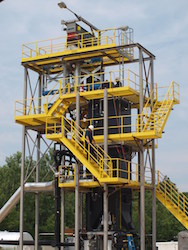PHG Energy (PHGE) will be constructing a new biomass gasification plant that will convert more than 30 tons of composted material per day into thermal energy and biochar. Sevier Sold Waste (SSWI), located in Pigeon Forge, TN, contracted the PHG Energy. SSWI operates a garbage composting plant that processes more than 10,0000 tons per year from the Sevierville, Gatlinburg, Pigeon Forge and the Great Smokey Mountains National Park. All the municipal solid waste (MSW) is processed through the plant, with 60% of it being made into compost. The carbon footprint of the facility will be reduced by over 450 tons of CO2 emissions each year, according to EPA calculators.
“This new installation will help us reduce the amount of compost we need to transport by converting it into a biochar material, creating a new revenue stream for us,” said Tom Leonard, director of SSWI. “The energy from the gasification system will be used in a thermal oxidizer promoting odor control in the buildings and will allow us to defer other upgrades. This represents a significant savings from our current disposal and operating costs.”
PHGE’s gasification plants employ a thermo-chemical process that cleanly converts biomass to a combustible fuel gas. Around 90% of the biomass that is gasified in the PHGE system becomes fuel gas, and the only remaining residue is the charcoal-like biochar, that in SSWI’s case will be sold to a local industrial user as a renewable source of fuel to displace coal consumption.
The cost of the Pigeon Forge facility is $2.25 million. The project has been awarded a $250,000 Clean Energy Tennessee Grant through the Tennessee Department of Environment and Conservation (TDEC). The project will showcase PHGE’s second installation of its Large Frame gasifier, believed to be the world’s largest downdraft unit and capable of more than 60 tons per day throughput.
“This project is important to us for several reasons,” noted PHGE President Tom Stanzione. “This is our second municipal project to receive approval this year and demonstrates the growing confidence in our technology. We have a strong research and development commitment to converting MSW to energy and reducing landfill usage, and this is another significant step in that process. It is also very important to us that we have been able to prove the commercial value of our biochar as a commodity, and that it has become a positive factor in the economic equation of our systems.”


